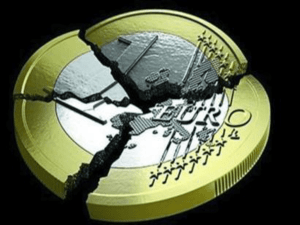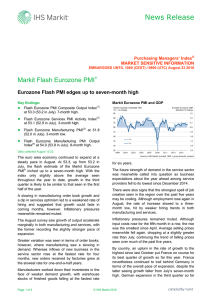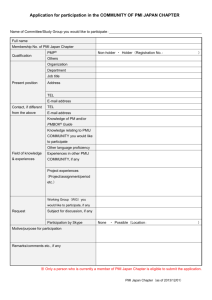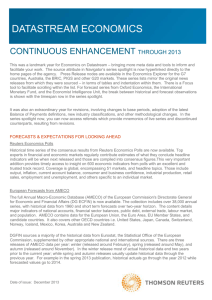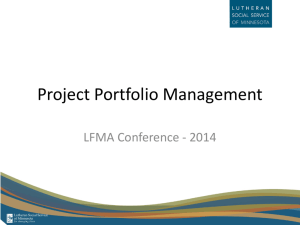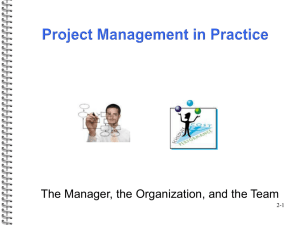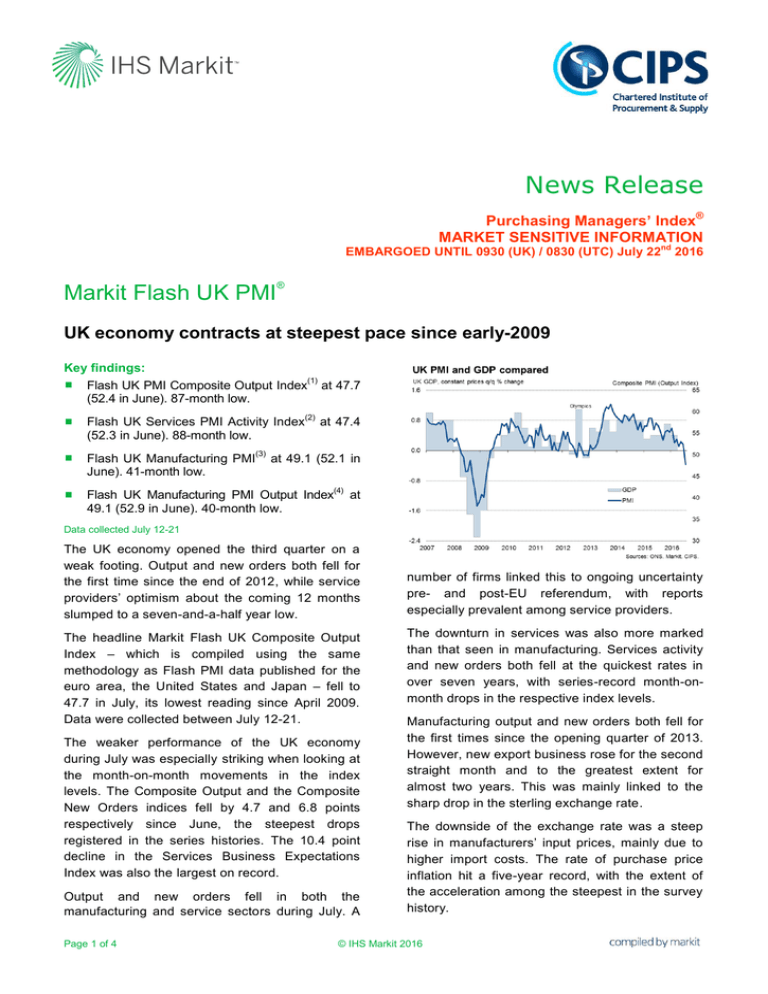
News Release
Purchasing Managers’ Index®
MARKET SENSITIVE INFORMATION
nd
EMBARGOED UNTIL 0930 (UK) / 0830 (UTC) July 22
Markit Flash UK PMI
2016
®
UK economy contracts at steepest pace since early-2009
Key findings:
(1)
Flash UK PMI Composite Output Index at 47.7
(52.4 in June). 87-month low.
Flash UK Services PMI Activity Index
(52.3 in June). 88-month low.
Flash UK Manufacturing PMI
June). 41-month low.
(3)
(2)
at 47.4
at 49.1 (52.1 in
(4)
Flash UK Manufacturing PMI Output Index
49.1 (52.9 in June). 40-month low.
at
Data collected July 12-21
The UK economy opened the third quarter on a
weak footing. Output and new orders both fell for
the first time since the end of 2012, while service
providers’ optimism about the coming 12 months
slumped to a seven-and-a-half year low.
The headline Markit Flash UK Composite Output
Index – which is compiled using the same
methodology as Flash PMI data published for the
euro area, the United States and Japan – fell to
47.7 in July, its lowest reading since April 2009.
Data were collected between July 12-21.
The weaker performance of the UK economy
during July was especially striking when looking at
the month-on-month movements in the index
levels. The Composite Output and the Composite
New Orders indices fell by 4.7 and 6.8 points
respectively since June, the steepest drops
registered in the series histories. The 10.4 point
decline in the Services Business Expectations
Index was also the largest on record.
Output and new orders fell in both the
manufacturing and service sectors during July. A
Page 1 of 4
number of firms linked this to ongoing uncertainty
pre- and post-EU referendum, with reports
especially prevalent among service providers.
The downturn in services was also more marked
than that seen in manufacturing. Services activity
and new orders both fell at the quickest rates in
over seven years, with series-record month-onmonth drops in the respective index levels.
Manufacturing output and new orders both fell for
the first times since the opening quarter of 2013.
However, new export business rose for the second
straight month and to the greatest extent for
almost two years. This was mainly linked to the
sharp drop in the sterling exchange rate.
The downside of the exchange rate was a steep
rise in manufacturers’ input prices, mainly due to
higher import costs. The rate of purchase price
inflation hit a five-year record, with the extent of
the acceleration among the steepest in the survey
history.
© IHS Markit 2016
A similar uptick in service sector costs was not
evident. The effects of rising fuel and other input
prices at service providers were partially offset by
subdued wage inflation, as employment in the
sector fell slightly for the first time since December
2012. Manufacturers also reported job cuts, the
seventh reduction in as many months.
Cost caution at manufacturers was not only
reflected in hiring decisions, but also in the
steepest reduction in purchasing activity since
March 2013 and a further depletion of stock
holdings. Meanwhile, weaker demand and
depletion of backlogs of work in both sectors
suggest further job losses may occur in coming
months. The rate of decrease in overall
outstanding business was a four-year record.
UK output prices rose during July, although the
pace of increase was only mild and weaker than in
the prior month. Service sector charges increased
at the slowest rate since February. Factory gate
price inflation reached a 23-month high as
companies passed on part of the surge in
purchasing costs.
Comments
Chris Williamson, Chief Economist at Markit, which
compiles the survey:
“July saw a dramatic deterioration in the economy,
with business activity slumping at the fastest rate
since the height of the global financial crisis in
early-2009.
represents a shock-induced nadir. Given the record
slump in service sector business expectations, the
suggestion is that there is further pain to come in
the short-term at least.
“With policymakers waiting to see hard data on the
state of the economy before considering more
stimulus, the slump in the PMI will provide a
powerful argument for swift action.”
David Noble, Group Chief Executive Officer at the
Chartered Institute of Procurement & Supply:
“The UK economy has suffered sharp falls in output
and new orders following the EU referendum as
uncertainty has taken hold. The overall pace of
decline was the strongest since early-2009.
“Weaker sterling has driven a steep rise in input
prices for manufacturers but there is a glimmer of
positivity with the new exchange rate encouraging a
rise in export orders. However, with a subdued
global economy, it is not yet clear whether these
opportunities will materialise in the long term.
“Supply chain managers must use this uncertainty
to demonstrate what they do best – being agile,
adaptive, sourcing the best goods and prices to
steer their organisations successfully in the months
and years ahead.
“The true extent of the impact of this uncertainty still
remains to be seen next month. But with optimism
in the UK’s service sector at a seven-and-a-half
year low, policymakers must take swift action to
stop further decline amid political upheaval.”
“The downturn, whether manifesting itself in order
book cancellations, a lack of new orders or the
postponement or halting of projects, was most
commonly attributed in one way or another to
‘Brexit’.
“The one ray of light was an improvement in
manufacturing export growth to the best for two
years as the weak pound helped drive overseas
sales, though producers also suffered the flip-side
of a weak currency as import prices spiked higher.
“At this level, the survey is signalling a 0.4%
contraction of the economy in the third quarter,
though much of course depends on whether we see
a further deterioration in August or if July
Page 2 of 4
© IHS Markit 2016
-Ends-
For further information, please contact:
For data queries, please call:
For industry comments, please call:
IHS Markit
Joanna Vickers
Tel: +44 207 260 2234
Email: joanna.vickers@ihsmarkit.com
CIPS
Trudy Salandiak
Tel: +44 1780 761576
Email: trudy.salandiak@cips.org
Note to Editors:
Final July data are published on August 1 for manufacturing and August 3 for services and composite indicators.
The Markit/CIPS UK Manufacturing PMI® is based on data compiled from monthly replies to questionnaires sent to purchasing executives in
over 600 manufacturing companies. The Markit/CIPS UK Services PMI is based on data compiled from monthly replies to questionnaires
sent to purchasing executives in over 650 services companies, covering transport & communication, financial intermediation, business
services, personal services, computing & IT and hotels & restaurants. Both survey panels are stratified by Standard Industrial Classification
(SIC) group and company workforce size, based on industry and company size contributions to GDP.
The UK Composite Output Index is a GDP-weighted average of the Manufacturing Output Index and the Services Business Activity Index.
The July flash estimate is based on approximately 85% of expected total PMI survey responses and is designed to provide an accurate
advance indication of the final PMI data.
The Purchasing Managers’ Index® (PMI®) survey methodology has developed an outstanding reputation for providing the most up-to-date
possible indication of what is really happening in the private sector economy by tracking variables such as sales, employment, inventories
and prices. The indices are widely used by businesses, governments and economic analysts in financial institutions to help better
understand business conditions and guide corporate and investment strategy. In particular, central banks in many countries (including the
European Central Bank) use the data to help make interest rate decisions. PMI® surveys are the first indicators of economic conditions
published each month and are therefore available well ahead of comparable data produced by government bodies.
Markit do not revise underlying survey data after first publication, but seasonal adjustment factors may be revised from time to time as
appropriate which will affect the seasonally adjusted data series. Historical data relating to the underlying (unadjusted) numbers, first
published seasonally adjusted series and subsequently revised data are available to subscribers from Markit. Please contact
economics@markit.com.
Notes
1. The Composite Output PMI is a weighted average of the Manufacturing Output Index and the Services Business Activity Index.
2. The Services Business Activity Index is the direct equivalent of the Manufacturing Output Index, based on the survey question “Is the level of business activity at your company higher,
the same or lower than one month ago?”
3. The Manufacturing PMI is a composite index based on a weighted combination of the following five survey variables (weights shown in brackets): new orders (0.3); output (0.25);
employment (0.2); suppliers’ delivery times (0.15); stocks of materials purchased (0.1). The delivery times index is inverted.
4. The Manufacturing Output Index is based on the survey question “Is the level of production/output at your company higher, the same or lower than one month ago?”
About IHS Markit (www.ihsmarkit.com)
IHS Markit (Nasdaq: INFO) is a world leader in critical information, analytics and solutions for the major industries and markets that drive
economies worldwide. The company delivers next-generation information, analytics and solutions to customers in business, finance and
government, improving their operational efficiency and providing deep insights that lead to well-informed, confident decisions. IHS Markit
has more than 50,000 key business and government customers, including 80 percent of the Fortune Global 500 and the world’s leading
financial institutions. Headquartered in London, IHS Markit is committed to sustainable, profitable growth.
IHS Markit is a registered trademark of IHS Markit Ltd. All other company and product names may be trademarks of their respective owners
© 2016 IHS Markit Ltd. All rights reserved.
About PMI
Purchasing Managers’ Index® (PMI®) surveys are now available for over 30 countries and also for key regions including the eurozone. They
are the most closely-watched business surveys in the world, favoured by central banks, financial markets and business decision makers for
Page 3 of 4
© IHS Markit 2016
their ability to provide up-to-date, accurate and often unique monthly indicators of economic trends. To learn more go to
www.markit.com/product/pmi.
About CIPS
The Chartered Institute of Procurement & Supply (CIPS) is the world’s largest procurement and supply professional organisation. It is the
worldwide centre of excellence on procurement and supply management issues. CIPS has a global community of 118,000 in 150 countries,
including senior business people, high-ranking civil servants and leading academics. The activities of procurement and supply chain
professionals have a major impact on the profitability and efficiency of all types of organisation and CIPS offers corporate solutions
packages to improve business profitability. www.cips.org
The intellectual property rights to the UK Flash PMI® provided herein are owned by or licensed to IHS Markit. Any unauthorised use, including but not limited
to copying, distributing, transmitting or otherwise of any data appearing is not permitted without IHS Markit’s prior consent. IHS Markit shall not have any
liability, duty or obligation for or relating to the content or information (“data”) contained herein, any errors, inaccuracies, omissions or delays in the data, or
for any actions taken in reliance thereon. In no event shall IHS Markit be liable for any special, incidental, or consequential damages, arising out of the use of
the data. Purchasing Managers' Index® and PMI® are either registered trade marks of Markit Economics Limited or licensed to Markit Economics Limited. IHS
Markit is a registered trademark of IHS Markit Ltd.
If you prefer not to receive news releases from IHS Markit, please email joanna.vickers@ihsmarkit.com. To read our privacy policy, click
here.
Page 4 of 4
© IHS Markit 2016

